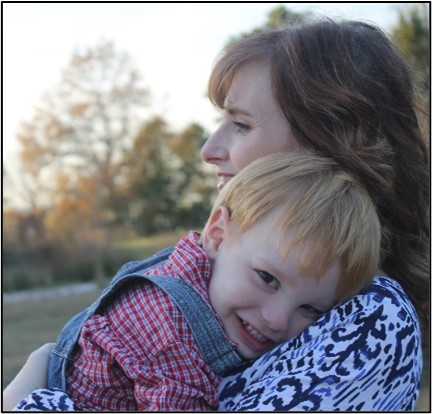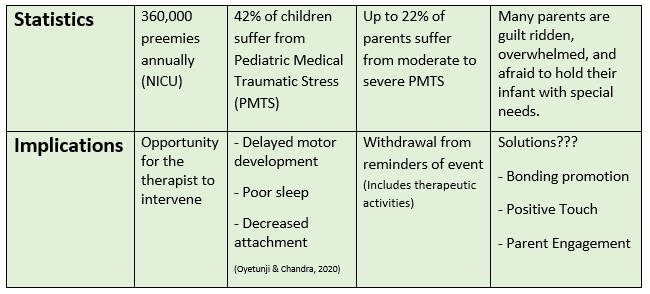Written By: Dr. Elizabeth G. Harvey, PT, DPT, MSR, DHSc Candidate, PCS
 Have you considered using the largest organ, our skin, to treat your smallest patients?
Have you considered using the largest organ, our skin, to treat your smallest patients?
Over the years I have become a total skin junkie! I find it amazing how stimulation of the integumentary system can impact bonding. This is critical, as the experience of maternal connection is often disrupted with medical complications, which can have life-long implications on development (Christofferson et al., 2020).
I have been working in pediatrics for over 20 years. If you are a therapist going into the home environment, think about how often you have arrived to find your patient in their car seat, or some other piece of equipment. Do the parents seem overwhelmed or fearful? Consider the emotional implications of having a child with medical complications and how it could impact parent engagement.
Factors Impacting Bonding:
- Baby’s physical appearance
- Baby’s behavior
- Confusion over medical information
- Fear of losing baby
- Emotions: guilt, sadness, grief, anxiety, helplessness (PMTS)
One in every ten infants is born preterm in the United States each year. The emotional stress that premature births put on the family unit can lead to deficits in motor development and learning (Feldman et al., 2014; Purdy et al., 2015). Pediatric therapists are uniquely positioned to offer help to these families.
Benefits of Massage:
- Weight gain (Lu et al., 2020)
- Reduced pain
- Improved weight gain
- Feeding tolerance
- Neurodevelopment
- Reduces gastric residual volume (reduces vomiting) (Seiiedi-Biarag & Mirghafourvand, 2020)
- Enhanced motor and sensory processing (Lu et al., 2019)
Please join me in my Live Webinar, Infant Massage and Bonding, on May 12, 2023 to see how you can offer real solutions to help parents engage in calming and caring for their infant! Practical tips for communication and touch therapy to address colic, pain, and sensory regulation will be explored. Maybe it’s time to take a deeper dive into the system of skin and how stimulation here can impact maternal bonding and infant development.
Explore online continuing education courses from Elizabeth below:
Ethics: A Physical Therapist’s Guide to Excellent Practice
Pediatric Application of Focal and Whole-Body Vibration
Utilizing Neuroplasticity to Improve Pediatric Motor Learning
Visit summit-education.com for more information.
References:
Christofferson, JL, Okonak, K, Kazak, AE, et al. (2020). Family consequences of potentially traumatic pediatric medical events: Implications for trauma-informed care. Journal of Family Psychology. 34(2): 237–246. https://doi.org/10.1037/fam0000597
Feldman, R., Rosenthal, Z., & Eidelman, A. I. (2014). Maternal-preterm skin-to-skin contact enhances child physiologic organization and cognitive control across the first 10 years of life. Biological Psychiatry, 75(1), 56–64. https://doi.org/10.1016/j.biopsych.2013.08.012
Lu, L. C., Lan, S. H., Hsieh, Y. P., Lin, L. Y., Chen, J. C., & Lan, S. J. (2020). Massage therapy for weight gain in preterm neonates: A systematic review and meta-analysis of randomized controlled trials. Complementary Therapies in Clinical Practice, 39, 101168. https://doi.org/10.1016/j.ctcp.2020.101168
Oyetunji, A & Chandra, P. (2020). Postpartum stress and infant outcome: A review of current literature. Psychiatry Research. 284:112769. https://doi.org/10.1016/j.psychres.2020.112769
Purdy, I. B., Craig, J. W., & Zeanah, P. (2015). NICU discharge planning and beyond: recommendations for parent psychosocial support. Journal of perinatology. 35(1), S24–S28. https://doi.org/10.1038/jp.2015.146
Seiiedi-Biarag, L., & Mirghafourvand, M. (2020). The effect of massage on feeding intolerance in preterm infants: A systematic review and meta-analysis study. Italian Journal of Pediatrics, 46, 1-10.

